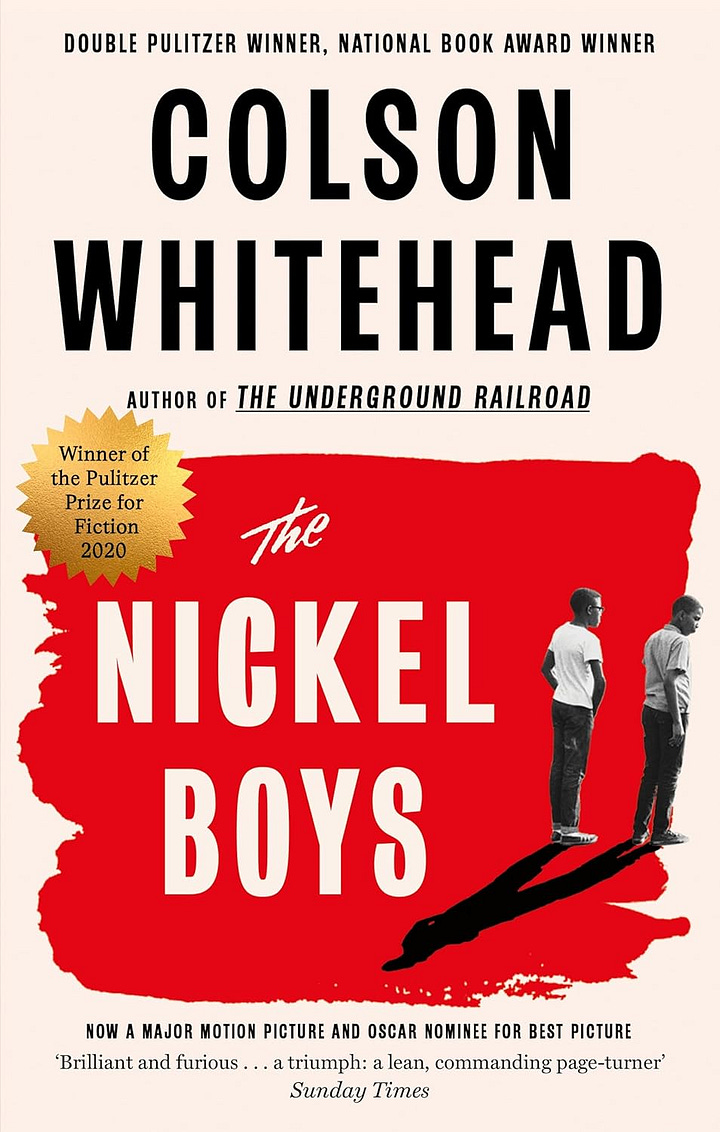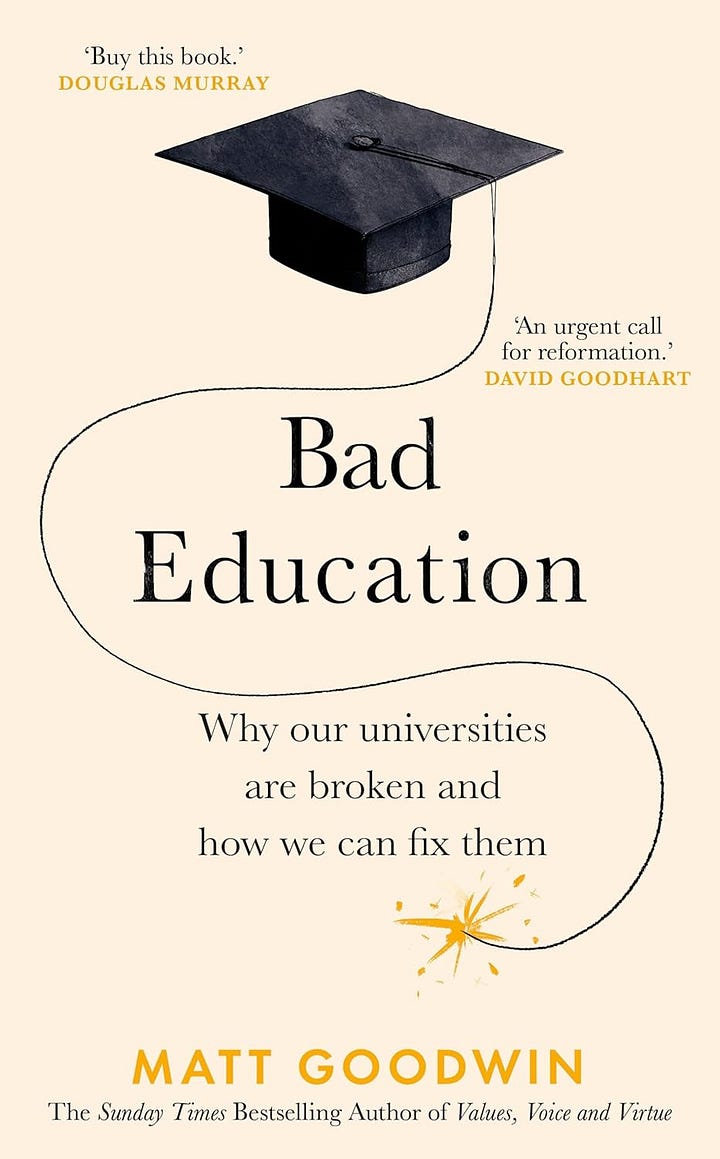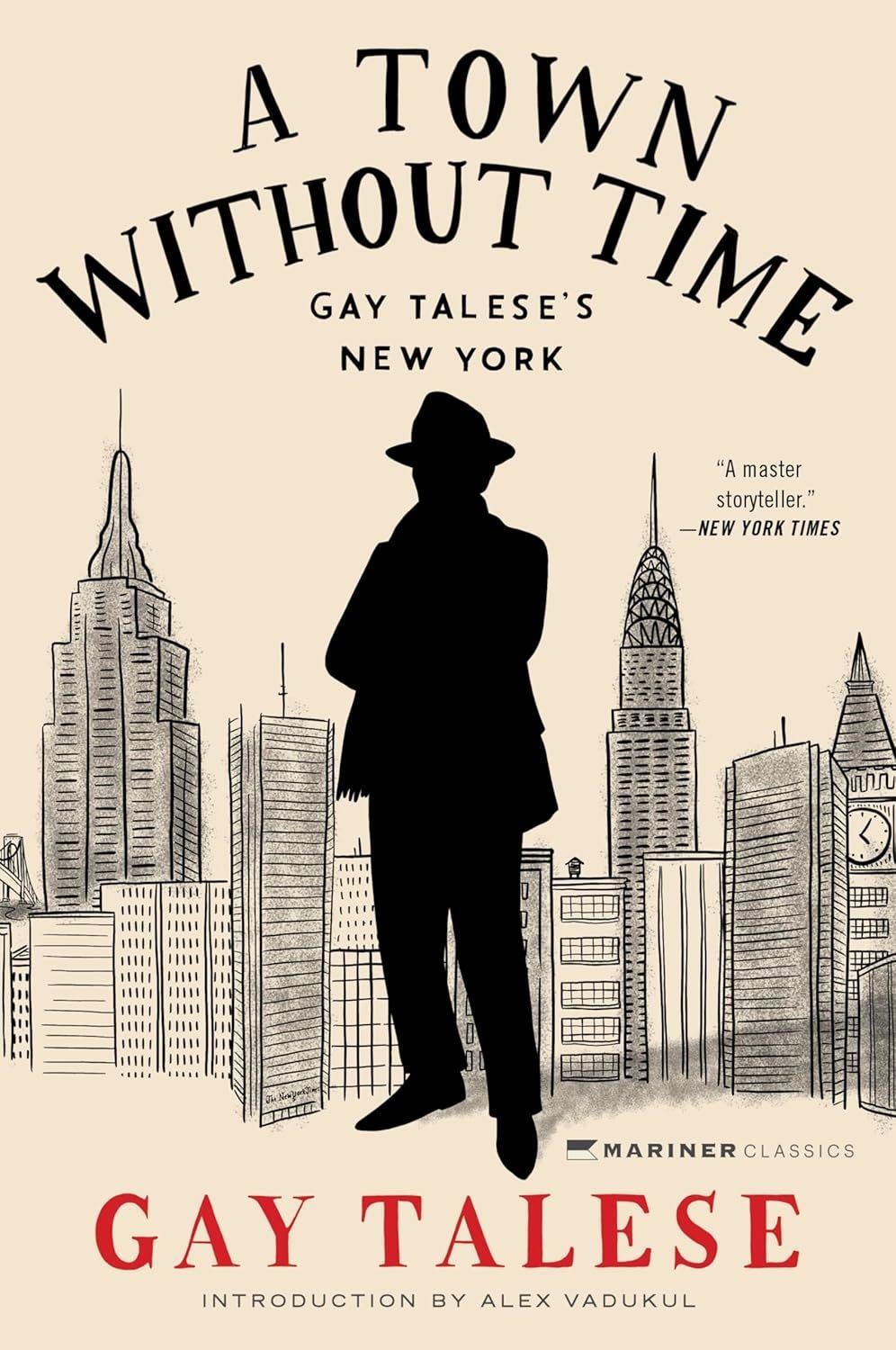Start the Week #92
(Almost: what's a day between friends?) And Terry Freedman STILL has a cold.
Greetings!
I am at least a day behind in publishing all my regular articles. What can I say? Sorry.
But enough of this persiflage! On with the newsletter.
Terry
Competition
Last week I announced a competition to win a copy of Gay Talese’s new book, A Town Without Time. I’m extending the deadline to Friday. If you’re eligible, ie resident in the UK and a subscriber to this newsletter, you really should enter, because I can absolutely guarantee that if you don’t then you won’t have any chance of winning. It’s astonishing really, the well-known phenomenon of people not entering because they think they have no chance of winning. A few years ago, I announced a competition to the readers of another newsletter of mine that had 5,000 subscribers. Guess how many people entered? One.
This article continues after this message from our sponsor, which happens to be me:
I myself have won a weekend trip for two in Vienna, and on another occasion a dozen newly-published books. As Woody Allen once said, eighty percent of success is showing up. Here are the competition details, along with a mini review of the book, again. Enter!
Quick look: A Town Without Time
Anyone who is familiar with Talese’s work will know that he has an eye for detail, and an ear for dialogue. The very first essay in this book is called New York Is A City of Things Unnoticed, and it exemplifies both of these characteristics.
For example, Talese makes a point of speaking to the concierges outside hotels, because they see and hear everything, and are, at the same time, almost invisible. The concierge outside a hotel down the street from a theatre hears people talking about the play as they walk past. He says he can tell whether a production will be a flop or a success withon ten minutes of the curtain call.
In a section where he is discussing the statue of liberty, Talese writes:
But most neighborhood folks pay no attention to the statue. The gypsy fortune-tellers who work to the left of it do not; the habitués of Mrs. Stern’s tavern below it do not; the soup slurpers in Bickford’s restaurant across the street do not. A New York cabby, David Zickerman (Cab No. 2865), has whizzed by the statue hundreds of times and never knew it existed. “Who the hell looks up in this town?” he asks.
The devil is in the detail, and reading that passage is almost as good as being there!
There are several other articles, some of which haven’t seen the light of day for ages, and a delightful article about the feral cats in New York3. Also included is the essay that Talese regards as his finest, Mr Bad News, which is about the then obituary writer for the New York Times:
“Furthermore, he admits that, after having written a fine advance obituary, his pride of authorship is such that he can barely wait for that person to drop dead so that he may see his masterpiece in print.”
I’d better not say any more because I have been asked to write a review of the book for Teach Secondary magazine. However, the kind PR person at Harper Collins has agreed to offer a copy as a prize. To be in the running, you have to do four things:
Identify what the subtitle of this issue of the newsletter alludes to.
Live in the UK.
Subscribe to Eclecticism.
Fill this form in and submit it by midnight British Summer Time on 30th March 2025.
Wedding anniversary
Recently it was our wedding anniversary. Every time it comes around I can’t help thinking of the joke told by Frank Carson, Irish comedian:
My wife and I have been married for 47 years. It feels just like yesterday. And what a bloody awful day yesterday was!
Reading matters


I’ve just finished reading The Nickel Boys, by Colson Whitehead. It’s pretty harrowing and upsetting, made the more so by being based on actual events. It’s about a so-called reform school in Florida, where pupils were beaten, raped and even killed.
I’m now reading Bad Education. How about this for a tough gig. I have been asked by the editor of Schools Week to review this book. Now, I already have my own views about university these days, formed from having spoken to people who have recently attended university, the attempts by students, and even staff, to silence views they disagree with (if the stories in the media are to be believed) and my doubts about the efficacy of the funding model.
So what makes this gig tough?
Firstly, I imagine that I’m expected to write my review in the context of
’s wider views, which some people label as right wing.Secondly, I have my existing views.
When I review a book I review it as it is, by which I mean not taking into account other work by the same author. Obviously, some people disagree with this approach. I was reading about an editor of, I think, a social science journal who charged his reviewers with writing quite an extensive survey of an author’s previous works in order to place the present one in some sort of context.
And a couple of years ago someone took me to task on Twitter (as it was then), when I failed to state that the book in question was the best thing since sliced bread. He said something to the effect of: “Isn’t Terry Freedman aware of all the great stuff [author] has done?”.
Yes I am, but I wasn’t reviewing all the other stuff, just this book!
So there’s that, plus needing to read this in a state of tabular rasa. Can I do it? Yes of course! But I think it’s good to acknowledge the challenges in advance.
Goodwin covers the reasons he left academia, scholars, students and the system. Then he proposes some solutions.
I haven’t read enough of it yet to begin forming some opinions, but once I’ve reviewed Bad Education for Schools Week, and it’s been published, I’ll publish the review more widely a couple of weeks after that.
Writing courses
asks: How do you decide on what works to introduce them to/highlight? Do you make them aware of this platform as a place to get over the fear of sending words out into space?
My choice of reading material is based on what the focus of the lesson is. For example, in the lesson on choosing the right word, I introduced the class to David Foster Wallace’s article Shipping Out (also published as A Supposedly Fun Think I’ll Never Do Again). For the lesson on dialogue, I selected a story by Gay Talese. I also recommended more general books on writing, such as Dreyer’s English.
One of the first things I did was tell the students about Substack, and what a positive space it is. However, the bigger challenge was encouraging them to submit anything at all for scrutiny just in our course, let alone more publicly. Don’t you think, as I do, that putting ones work out there takes an enormous amount of courage?
In case anyone reading this is remotely interested, I’m considering applying to teach an advanced creative nonfiction course, in addition to the classes I’m already booked to teach (including an online one):
Creative writing using constraints
Sax chronicles
Yo, cats, Johnny Cool1 here. 🎷🎼🎵🎶I had an interesting experience the other day. In my sax lesson we had to play the very high notes. I couldn’t manage a thing, which was hugely frustrating because back in October I taught myself to do so! So the next day I practised at home, and mastered them again. But every time I thought to myself, “That worked.”, it went wrong. Ditto when I thought, “Oh, I’ll record it to share with the class.”
Elaine, who is a musician, tells me it’s because as soon as your thoughts wander (especially in that direction) you automatically tense up. So that’s the next challenge: to de-tense myself and/or to stop thinking.
I’ve signed up for the next course, and the one after that. I’m either an optimistic masochist or a masochistic optimist. Still, it keeps me off the streets!
Articles you may have missed
Cindie Reller meets The Prince
Letter to Rebecca It’s her turn to reply to me, so do subscribe so as not to miss it:
. Rebecca has branched out into the world of flash fiction. Here’s her excellent story: Let Fire Inspire.Congrats to
on the publiction of his new novel.And
is back with a new story, The Botanist.Videos
I filmed this in The Outernet, in London, opposite Tottenham Court Road station:
Here’s Fats Waller singing Your Feet’s Too Big:
This song may be tackled in the sax class, so I think I’ll give it a whirl myself soon:
Well that’s it from me for now. Do consider subscribing or, if you already do, upgrading to a paid subscription.
I changed my name from Johnny Sax to Johnny Cool when I had almost mastered the smooth, cool sound of Paul Desmond. Not, I hasten to add, his proficiency! But his tone, which is quite lovely in my opinion:



Happy Anniversary to you both, Terry.
Hope you get some entries into the competition.
I remember reading about a Japanese game show where someone is locked in a room and they can only leave once they've won some large sum of money or x amount of competitions. They've given magazines, or something, and they have to just sit and apply endlessly to competitions!
Nice info about the courses, thanks. Go for it with the other course! The writing with constraints is surely made for you to teach!
Sad that I cannot enter the competition, as I'm not a UK resident. Also, I'm afraid I've got no clue as to what the subtitle of this issue alludes to. So, that's a non starter for me. But I enjoy reading you, always. And happy anniversary! (Carson's joke is so good)